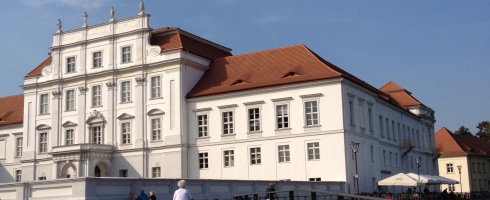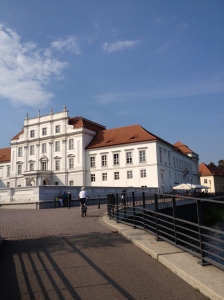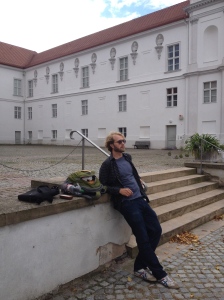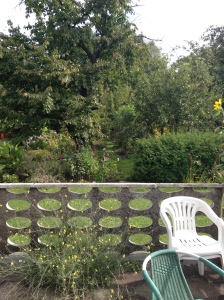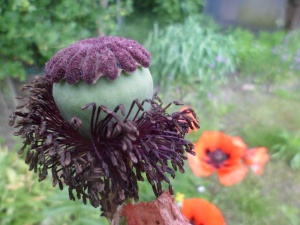During Freddie’s recent visit to Berlin, we spent a night at my friend Margareth’s garden house to get away from the hustle and bustle of the big city. The small house is on a plot of land in a kleingarten community in Oranienburg, a town on the outskirts of Berlin accessible by a short train ride. Walking from the train station, we passed the Schloss Oranienburg, the oldest example of a Baroque palace in the district of Brandenburg, according to my hasty spoken translation of the sign for Freddie’s benefit.
It was built in the Dutch style by Frederick William, Elector of Brandenburg, from 1650-52 as a gift to his wife, Countess Louise Henrietta of Orange-Nassau (or Oranien-Nassau in German), who apparently loved the region. I suppose the utter flatness of the landscape reminded her of her Dutch homeland. Having grown up in Denver, Colorado, forever watched over by the mountains to the west, I can’t get next to that, but different strokes. Freddie (the Elector of Brandenburg, not my girlfriend) named the castle Oranienburg, something like Orange Castle, in the Countess’ honor, and changed the name of the town too not long after.
It was lovely, the garden home. We cooked some food, went for a walk or three, read books, tried to get the television to work to watch some presumably bad German TV. Mostly we relaxed. Life is slower out there, in the garden.
Sometimes we wandered through the extensive garden itself, pointing out this or that plant. “What is this plant, Ian?” “It’s a, um, I’ve heard the German word before, but I can’t think of it right now. Hagebutte maybe? I don’t even know if there is an English word.” “Isn’t it rose hips?” “Oh, right.”
I pointed out what I thought was a thistle, which Freddie identified as an artichoke plant. “Really? I had no idea artichokes grow like that.” Turns out we were both right! Wikipedia says that “[t]he globe artichoke … is a variety of a species of thistle cultivated as a food.” I won’t link to the article because it could change at any moment.
Thinking of thistles got me thinking of history, and the connection between history and the present. In a couple weeks, I thought at the time, Scotland, a nation which has long used the thistle as a symbol, will vote on whether it would like independence from England. The roots of the two countries’ entanglement go back centuries, with decades of relative peace broken by many episodes of anger, unrest, war, changes in the balance of power.
Around the time Freddie (the Elector) was having the Oranienburg castle built, he and the Countess Louise got a new nephew, born in her hometown, the Hague. Almost 40 years later this nephew, William of Orange, assumed the throne of England, Scotland, and Ireland. In what some people called the Bloodless Revolution (many Scots would disagree), the English Parliament invited Billy to invade their country because they didn’t like the king, a Scot named James (II or VII, depending on who you asked) of the house of Stuart. It was essentially a religious disagreement, as most political conflicts are. James was Catholic with French ties, Parliament and England were largely Anglican, which was essentially the same thing so who gives a fuck? A lot of people. Both sides said the other was intolerant, everyone tried to stir up public support by appealing to their own side, and James did not manage to play this game so well.
James escaped to France where he raised a couple generations of entitled royals sans land or people. Bored with court life, they longed for their rightful place on the throne of Scotland, welcomed by all Scots as the true Stuart king. Meanwhile Billy, or William III as he was more properly known, got to work trying to rule England. There were all sorts of dealings with Parliament, acts of official religious tolerance and of exclusion, and a lot more stuff that’s complicated and I don’t really understand. It was tough dealing with a large legislative body in a largely foreign country with many conflicting interests. Perhaps, as Mark E. Smith said, “[he] used to think [he] could do what [he] wanted to,” but was instead in the “wrong place, right time.”
“Can’t dance can’t sing / Cursed forever is William of Oranj”
A couple monarchical reigns later, Great Britain was ruled by a series of Georges of Hanover. A lot of Scots were still not happy with this foreign rule and were suffering under perceived hardships — taxation and lack of access to food, according to songs written by the still extant followers of James, known as Jacobites. In “Welcome Royal Cherlie,” we hear:
We daurnae brew a peck o’ maut
Or German Geordie finds a faut
And for our kail we’ve scarce got saut
I’m no expert on the Scots dialect, but I think it means something like, “We dare not brew even a small amount of malt, or German George will find a fault with us. And we hardly have any salt for our kale.” This song was written on the occasion of the second (or third, or fourth, depending on how you count it) Jacobite rebellion since James II/VII was forced out some 50 years before, leaving “a dighty German” to “rule us all.” In 1745 his grandson Bonnie Prince Charlie, affectionately known to followers as Cherlie, left his comfortable digs in France to attempt a takeover of the British crown.
Support of the Jacobite cause was not so monolithic as the songs make it out to be. Quite a few Highland clans were with Cherlie and he had early successes in battle, but as he marched south towards lower Scotland and England it became harder to muster troops and supplies. It probably didn’t help that he was essentially holding cities like Edinburgh and Glasgow against the will of much of the population, demanding food and provisions under threat of force. My own ancestors, the lowland Clan Douglas, who some 400 years earlier gained massive pro-Scotland cred by fighting against the English alongside King Robert the Bruce and then carrying his heart to the Holy Land, by this time had risen a bit in the British aristocratic ranks and were quite comfortable, thank you very much. Cherlie’s troops burned Castle Douglas on their way somewhere.
Long story short, the bonnie prince didn’t make it. Not enough local support, allies in France and England didn’t make good on promises for more troops, and Cherlie had to sneak away dressed as a maiden, as immortalized in the “Skye Boat Song,” written over 100 years later. That was that! Who knows what kind of king the man would have been, anyway. He had no more connection to the land than the German-born ruler he sought to depose, and no experience with running a country.
But the songs from the Jacobite uprisings are great. The lyrics are nasty and specific in their anti-Englishness, proud in their proclamation of Scottish self-rule. “Johnnie Cope” tells of the cowardice of the titular English commander, who apparently, when confronted by the “din” of the highland bagpipes, would run away.
I wondered who was writing these songs. Most are called “traditional,” so it’s hard to say. Did they issue from the pens of proletariat rabble-rousers? From former aristocrats left without land and title for supporting the wrong side in a previous debacle, vying now for popular support for relatively selfish reasons? Anyway, there were more plants to look at in the garden, including several varieties of mint and lots of chard.
